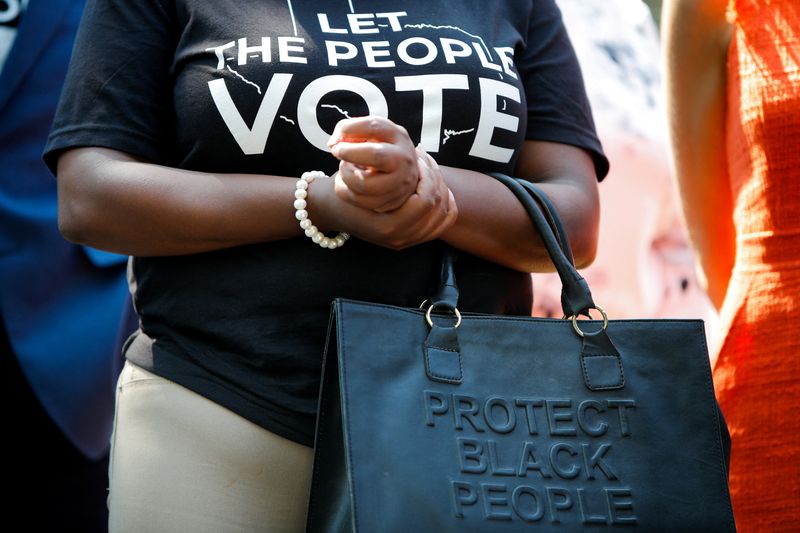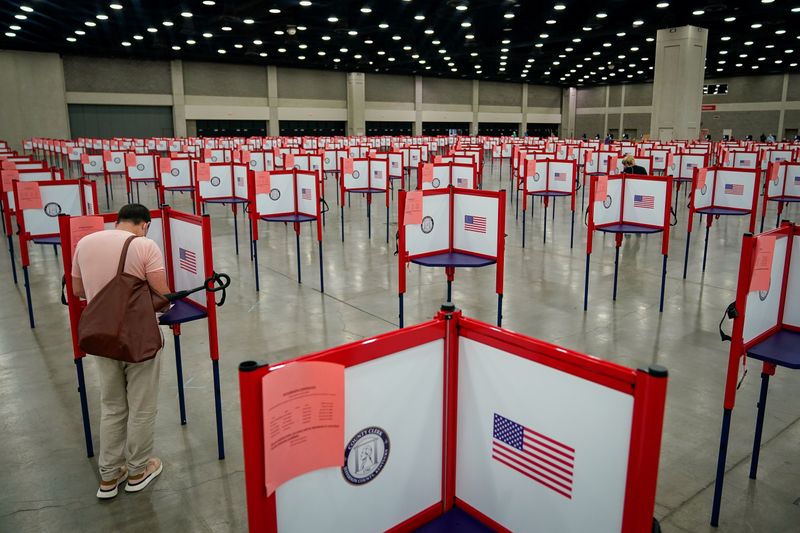By Julia Harte
(Reuters) - From voter ID requirements to laws giving partisan entities such as state legislatures more control over election management, U.S. states enacted more than 30 new voting restrictions in 2021, adding fuel to a national debate over whether such changes hinder voters' access or preserve election integrity.
The measures have raised tensions between the Republican and Democratic parties ahead of congressional elections in November that will determine which party controls the U.S. Senate and the U.S. House of Representatives, which are currently narrowly held by the Democrats. Most of the measures were backed by Republican state legislators and opposed by Democrats, but the divide is not purely red and blue. And the debate over each law sometimes comes down to the fine print.
VOTER ID
Seven of the 50 U.S. states imposed stricter voter identification requirements last year, according to the Brennan Center for Justice, which tracks voting legislation across the country.
Opponents of voter ID measures do not object to the requirement that voters verify their identity when voting -- which is already standard in every state -- but rather the means used to verify them.
Unlike many European democracies, where government-issued IDs are more ubiquitous, studies have found that millions of U.S. voters lack photo ID.
Two of the most controversial 2021 laws changed the ID rules for absentee or mail-in ballots.
Georgia now requires voters who lack driver’s licenses or state ID cards to include in their absentee ballot application a photocopy of another government-issued ID such as a passport, which many voters may not be able to easily produce. Previously, absentee voters’ identities were verified by matching signatures.
Texas’ law permits voters to use a broader set of IDs when applying for and casting mail-in ballots. But it automatically rejects them if the voter uses a different ID number than what they provided when registering to vote.
Harris County, which contains Houston, reported in February that because of the law it had rejected more than one-third of all mail-in ballot applications -- an abnormally high rate.
Advocates of the Georgia and Texas measures say they are needed to ensure that voters are who they claim to be, and cite studies that show some voter ID laws have not depressed turnout. Opponents say there is no need for stricter ID rules because voter fraud is already vanishingly rare, and point to studies demonstrating that voter ID laws in states such as North Carolina reduced turnout by voters of color.
MAIL-IN VOTING
Mail-in voting laws are especially complex in the United States. Only 11 countries in the world do not require voters to provide a reason to vote by mail, according to the Stockholm-based International Institute for Democracy and Electoral Assistance.
Two-thirds of American states are in this category. But in 2021, 14 states passed laws making it harder for voters to apply for, receive, or cast mail-in ballots, while 16 states made it easier, according to the Brennan Center.
Some states' laws restricted mail-in voting one way while easing it other ways. For example, Kentucky’s Republican-controlled legislature passed a law allowing voters to fix absentee ballots if they made errors, but also limiting the application period for the ballots.
Proponents of limiting mail-in voting say the process adds to the cost of running elections and creates more opportunities for ballots to be intercepted by unintended recipients who might fraudulently cast them. Advocates of expanding mail-in voting say limiting it hinders voters who cannot go to a polling place.
VOTER LIST MAINTENANCE
Unlike many democratic countries, the United States does not have compulsory voter registration through a centralized system. As a result, states must periodically review their lists of registered voters to ensure they are up-to-date.
In 2021, seven states enacted laws that facilitated the delisting of voters. Advocates of the laws say they are necessary for ensuring only eligible voters are kept on the list. But opponents say the laws make it harder for voters to know they have been removed or remedy wrongful removals.
The Democratic Party sued Arizona after its legislature passed a law giving itself the power to appoint third parties to review the state’s voter rolls for ineligible voters. The law mandated that any voters deemed ineligible be removed, but did not require those voters to be notified: a provision that Democrats said violated Arizonans’ constitutional rights.
PARTISAN VS. NONPARTISAN ELECTION ADMINISTRATION
The United States has one of the world's most fractured election administration systems. In most states, elections are overseen by elected or appointed state officials. Within each county in a state, elections are run by local officials such as clerks and judges, sometimes in conjunction with nonpartisan or bipartisan election boards.
Few state-level voting laws sought to change election management authority before the hotly contested 2020 election, in which Republican former President Donald Trump falsely blamed his loss on voter fraud.

But last year, 16 states enacted laws that shifted power away from traditional election managers and in many cases ceded control to partisan actors such as state lawmakers, according to Voting Rights Lab, a U.S. voting advocacy group. Advocates of the laws, who were overwhelmingly Republican, argued they would bolster oversight of local election officials.
Such laws are unusual in other democracies. The Council of Europe, a human rights watchdog, adopted guidelines in 2010 calling for high-level positions within election-management bodies to be “dispersed among parties” to ensure balance.
